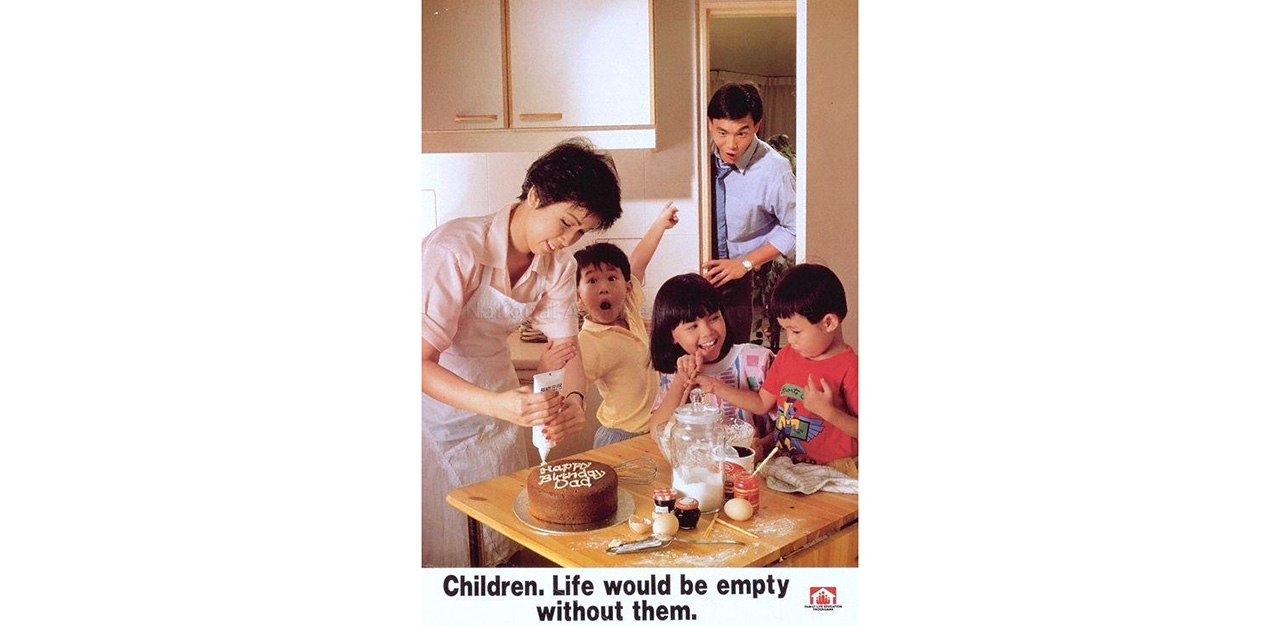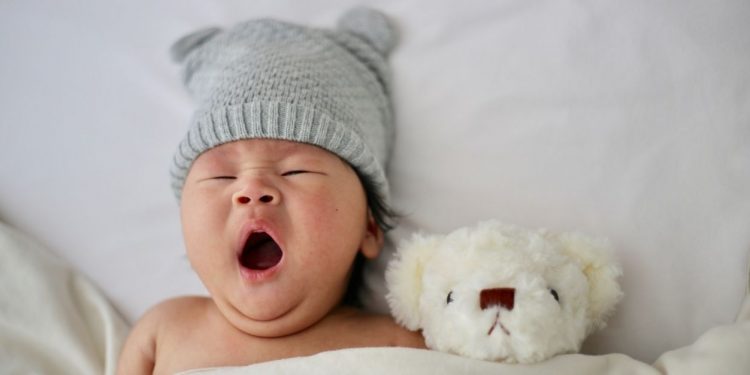This three-part series reflects on key turning points in Singapore’s journey towards achieving gender equality. Here, writer Kellynn Wee focuses on the government’s intervention in women’s reproductive lives. She describes the Great Marriage Debate of 1983, how it relates to issues around motherhood, and its link to social engineering policies today.
Sixteen-year-old Wang Lixin came under fire recently for a Straits Times forum letter proposing that women be conscripted into Singapore’s National Service – so that they would be more likely to meet men, get married, have children, and boost Singapore’s birth rate.
Ms Wang’s comments lit up the internet, partly because we love talking about the kids we are not having. Our flagging fertility has become something of a national joke (consider Senior Minister of State’s Josephine Teo’s immortal comment about us not needing “much space to have sex”) but Singaporeans’ desire to make babies is a matter of serious political interest.
The Government anxiously peers into our bedrooms because not producing natal citizens means importing working-age labour from elsewhere to support our economy and our ageing population.
High rates of migration challenge our national imagination of what our country should be and who should be allowed to call themselves “Singaporean” – a topic that has sparked xenophobic sentiments and frictions in our city-state.
The reproduction of children is still seen as the province of women, who are expected to take on the primary role of nurturing and raising kids.
The problem, then-Prime Minister Lee Kuan Yew suggested in 1983, is that not only were we not having enough babies, we were not having the right kind of babies; intelligent, produced by married university-educated women, and mostly Chinese.
So the People’s Action Party began to act to create a nation in its intended image.
The Great Marriage Debate: “You can’t be a doctor and also bring up children”
The late-Prime Minister Lee’s National Day rally speech in 1983 included his reflections on what he expected out of Singapore’s women: “We shouldn’t get our women into jobs where they cannot, at the same time, be mothers.
“You just can’t be doing a full-time heavy job like that of a doctor or engineer and run a home and bring up children.”

According to sociologist Lenore Lyons (a leading scholar on the feminist movement in Singapore), the Government identified two social issues that needed serious remedying. First, there was an increasing number of unmarried women in Singapore’s tertiary institutions. Second, there was a lower reproduction rate among Chinese women. These were considered to be critical problems that would lead to a loss of overall talent.
As Mr Lee said in his speech, “Our most valuable asset is in the ability of our people. Yet we are frittering away this asset through the unintended consequences of changes in our education policy and equal career opportunities for women. This has affected their traditional role as mothers.”
His comments mourned women’s inhabitation of new roles as participants in Singapore’s blossoming new economy, and their exit from full-time motherhood, while also stoically recognising that female labour force participation was crucial to Singapore’s continued success.
In some ways, this precisely reflected the “second shift” that women are expected to pull – a term coined by sociologist Arlie Hochschild, which refers to the fact that women are expected to participate fully as waged workers in the economy, then return home and get to their second jobs: that of mothering their children.
This double burden often means that women receive lower wages and fewer advancement opportunities in their jobs, while still being expected to carry out the lion’s share of housework and child-rearing.
As political scientist Meredith Weiss comments, “However aggressively chastised for their ‘recalcitrant fertility’, [Singaporean] women have had to fight for themselves to obtain full status in the labour force they have been prodded to augment.”
Eugenicist thinking: Nature trumps nurture
The late prime minister’s comments also reflected a eugenicist strain: That a person’s capabilities are prominently determined by the genes of their parents, rather than the resources they had access to or the environment that they experienced growing up. People with ‘superior’ genes should thus be supported in their reproduction efforts, while people with ‘inferior’ genes should be discouraged from having children.
In other words, nature trumps nurture.
He said, “If we continue to reproduce ourselves in this lopsided way, we will be unable to sustain our present standards. Levels of competence will decline.”
Geraldine Heng and Janadas Devan made the subtext of these comments explicit. They tracked how class and race were “suppressed categories of [Lee’s] anxiety, since the women of recalcitrant fertility were by and large Chinese, upper- and middle-class professionals, while those of inordinate reproductive urges… comprised… working-class women of Malay and Indian ethnic origin.”
The view that genes have a crucial role to play in the inheritance of intelligence has actually been widely discredited by the scientific community. The “twin studies” that Mr Lee cited to support his policy decisions – longitudinal studies that showed that twins raised in different environments often had similar outcomes – had, even in the 1970s, been dismissed as theoretically weak, partly the consequence of data fabrication and scientific fraud.
Policies in place
The late Singapore leader’s speech heralded a slew of policies aimed at encouraging some Singaporeans to have children, while disincentivising others from reproducing.

At the National University of Singapore, entry requirements were lowered for male applicants in 1983 in order to increase the number of male students and to curb the “problem of having unmarried graduate women,” as Professor Lim Pin, then vice-chancellor, described it.
The PAP also introduced the Graduate Mothers’ Priority Scheme in 1984, where children of university-educated women with at least three children were given priority to enter the primary schools of their choice. Married women with at least five O’level passes could also claim significant tax reliefs for their first three children.
The Social Development Unit was established in January 1984 at the Ministry of Finance, aiming to matchmake university graduates in the public sector; in 1986, this scheme included graduates employed in the private sector.
At the other end of the scale, a sterilisation incentive of S$10,000 was paid into the Central Providence Fund of women who had no ‘O’ level passes below the age of 30 – if they agreed to sterilisation after having the first or second child. This was provided her husband also did not have any ‘O’ level passes, and if they earned less than S$1,500 (US$1,113) per month combined.
This cash grant was a highly attractive offer, often enough to cover the initial deposit for a small apartment.
If a woman who had received the incentive gave birth to another child, she had to repay the $10,000 cash grant at the rate of 10 per cent compound interest per year. In Class C maternity wards – which often served women from lower-income backgrounds, delivery fees were higher for third or fourth children in the family.
An incendiary response
These policies attracted significant backlash and unusual public outcry: Enough for the PAP to lose a number of votes in the resulting elections in 1984. Most of these policies were scrapped in 1985.
As part of a research project tracking women’s responses to these overt attempts at influencing their reproductive decisions, sociologist Dr Lyons spoke to women who were outraged by these developments.
She found that “for women in their twenties… being single was simply a reflection of their decision to pursue education and employment opportunities first. These women had not rejected marriage and motherhood; they merely postponed it. They were clearly angry at the Government’s suggestion that they were a ‘problem’. After all, they had only followed the Government’s own prescription to study and work hard… why, they asked, did the Government encourage them to be independent and assertive in the work place, but not in their personal lives?”
The furore incited by Mr Lee’s 1983 speech was so incendiary that it prompted the creation of the Association of Women for Action and Research (AWARE), Singapore’s first explicitly feminist organisation, which published a policy paper refuting his approach and offering alternative suggestions.
Leaning in today
The societal expectations placed on women to perfectly balance parenting and waged employment, and to do it without appearing to break a sweat, is a perennial feminist issue.
In an era where women are increasingly invested in charting new paths, it is a thorny issue to talk about having kids: desiring or thinking about marriage and children can feel like a capitulation to stereotypical gender roles.
Yet of course people are interested in having children, and make strategic decisions around timing, resources, and emotional readiness.
Khoo Choon Yen, 30, was married for two years, settled into her flat, and established herself in a new job before she felt ready to have a child with her husband. The final reassurance she needed came from her company’s family-friendly policies.
“Flexible work hours, the company asking us to take time-off to spend time with family, being super excited when I announced my pregnancy – all of that put my mind at ease about what it meant for me to take on a new identity as a mother,” she says.
Beyond the support of her workplace, being a full-time working mother – a term that Ms Khoo dislikes, because, as she put it, “even without paid work, mothering and fathering are really full-time jobs!” – meant having to rely on existing childcare provisions, such as infant care services staffed by reliable edu-carers and subsidised by the Government.
Despite this, Ms Khoo comments that the limited length of paternity leave given to fathers in Singapore (eligible fathers are entitled to two weeks paid paternity leave, while mothers get four months) was something that she struggled to overcome. While appreciating the care offered by her extended family, she felt that the emotional turmoil that new mothers go through is something that only husbands can help with.
“Active fathering is inherently more challenging if they don’t have the same amount of parental leave,” she said. “State policies are sorely needed to set the tone for what’s minimally expected to support families.”
While the era of overt eugenicist policymaking is over, the Singapore Government has not shied away from continuing to try to influence its citizens’ family-making decisions – with some babies still more privileged than others.
For example, the Home Ownership Plus Education (HOPE) scheme continues to incentivise families from lower-income households to remain small by tying cash benefits to family sizes. These benefits are so attractive that the scheme has been described as coercive.
For a long time, unwed single mothers used to be differentially treated – for example, they received fewer weeks of maternity leave and did not receive tax incentives – to “encourage and support parenthood within the context of marriage… the prevailing societal norm in Singapore, and one which we seek to reflect and preserve.”
These policies have moved in a more heartening direction as the Government has, in recent years, slowly expanded the same benefits to single parents.
But having children goes beyond cash incentives and tax rebates.
As long as current policy and social structures signal that women are expected to carry out second shifts and be the primary manager of the household, and that parenting remains a female province rather than a responsibility equally shared, women who have worked very hard to find freedom from gendered expectations will continue to think twice about motherhood.
The second part of this series will be published on 30 March.














